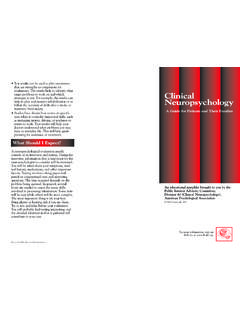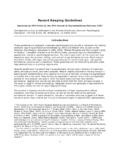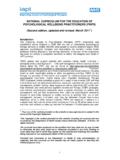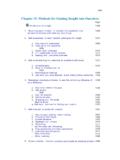Transcription of Pediatric Neuropsychology - div40.org
1 PediatricNeuropsychologyA Guide for Parents An educational pamphlet brought to you by the Public Interest Advisory Committee, Division 40 (Clinical Neuropsychology ),American Psychological Association 2001 Division 40, APAFor more information, visit ourWeb site at by APA Editorial and Design ServicesWhat Should I Expect?A neuropsychological evaluation usually includesan interview with parents about the child s history,observation of and interview with the child, andtesting. Testing involves paper and pencil andhands-on activities, answering questions, and sometimes using a computer. Parents may be askedto fill out questionnaires about their child s devel-opment and behavior. Many neuropsychologistsemploy trained examiners, or technicians, to assistwith the administration and scoring of tests, soyour child may see more than one person duringthe evaluation.
2 Parents are usually not in theroom during testing, although they may be presentwith very young children. The time requireddepends on the child s age and problem. Makesure your child has a good night s sleep before thetesting. If your child wears glasses or a hearing aidor any other device, make sure to bring it. If yourchild has special language needs, please alert theneuropsychologist to these. If your child is onstimulant medication, such as Ritalin, or othermedication, check with the neuropsychologistbeforehand about coordinating dosage time withtesting. If your child has had previous school testing, an individual educational plan, or hasrelated medical records, please bring or send thisinformation and records to the neuropsychologistfor you tell your child about this evaluationdepends on how much he or she can simple and brief and relate your explanation toa problem that your child knows about such as trouble with spelling, problems following directions, or feeling upset.
3 Reassure a worriedchild that testing involves no shots. Tell yourchild that you are trying to understand his or herproblem to make things better. You may also tellthe child that nobody gets every question right, and that the important thing is to try your best. Your child will probably find the neuropsychologi-cal evaluation interesting, and the detailed infor-mation that is gathered will contribute to yourchild s Neuropsychology is a professional specialty concerned with learning and behavior inrelationship to a child s brain. A Pediatric neu-ropsychologist is a licensed psychologist withexpertise in how learning and behavior are associat-ed with the development of brain structures andsystems. Formal testing of abilities such as memoryand language skills assesses brain functioning.
4 Thepediatric neuropsychologist conducts the evalua-tion, interprets the test results, and makes recom-mendations. The neuropsychologist may work inmany different settings and may have different rolesin the care of your child. Sometimes, the pediatricneuropsychologist is a case manager who followsthe child over time to adjust recommendations tothe child s changing needs. He or she may also pro-vide treatment, such as cognitive rehabilitation,behavior management, or psychotherapy. Often,the neuropsychologist will work closely with aphysician to manage the child s problems. Somepediatric neuropsychologists work closely withschools to help them provide appropriate educa-tional programs for the assessments are usually performed to deter-mine whether a child qualifies for special educationprograms or therapies to enhance school perform-ance.
5 They focus on achievement and skills neededfor academic success. Generally, they do not diag-nose learning or behavior disorders caused by alteredbrain function or are referred by a doctor, teacher, schoolpsychologist, or other professional because of one ormore problems, such as:A typical neuropsychological evaluation of aschool-age child may assess these areas: General intellect Achievement skills, such as reading and math Executive skills, such as organization, planning, inhibition, and flexibility Attention Learning and memory Language Visual spatial skills Motor coordination Behavioral and emotional functioning Social skillsSome abilities may be measured in more detailthan others, depending on the child s needs. Adetailed developmental history and data from thechild s teacher may also be obtained.
6 Observingyour child to understand his or her motivation,cooperation, and behavior is a very important partof the skills can be assessed in very young children. However, the evaluation of infants andpreschool children is usually shorter in duration,because the child has not yet developed many Is PediatricNeuropsychology?How Does a NeuropsychologicalEvaluation Differ From a SchoolPsychological Assessment?Why Are Children Referred for Neuropsychological Assessment?What Is Assessed?What Will the Results Tell Me About My Child?By comparing your child s test scores to scores ofchildren of similar ages, the neuropsychologistcan create a profile of your child s strengths andweaknesses. The results help those involved inyour child s care in a number of ways. Testing can explain why your child is havingschool problems.
7 For example, a child may havedifficulty reading because of an attention problem,a language disorder, an auditory processing prob-lem, or a reading disability. Testing also guides thepediatric neuropsychologist s design of interven-tions to draw upon your child s strengths. Theresults identify what skills to work on, as well aswhich strategies to use to help your child. Testing can help detect the effects of developmen-tal, neurological, and medical problems, such asepilepsy, autism, attention deficit hyperactivity disorder (ADHD), dyslexia, or agenetic disorder. Testing may be done to obtain abaseline against which to measure the outcome oftreatment or the child s development over time. Different childhood disorders result in specificpatterns of strengths and weaknesses. These pro-files of abilities can help identify a child s disorderand the brain areas that are involved.
8 For exam-ple, testing can help differentiate between anattention deficit and depression or determinewhether a language delay is due to a problem inproducing speech, understanding or expressinglanguage, social shyness, autism, or cognitivedelay. Your neuropsychologist may work with yourphysician to combine results from medical tests,such as brain imaging or blood tests, to diagnoseyour child s problem. Most importantly, testing provides a better under-standing of the child s behavior and learning inschool, at home, and in the community. The eval-uation can guide teachers, therapists, and you tobetter help your child achieve his or her potential. Difficulty in learning, attention, behavior,socialization, or emotional control; A disease or inborn developmental problem thataffects the brain in some way; or A brain injury from an accident, birth trauma, or other physical neuropsychological evaluation assists in better understanding your child s functioning inareas such as memory, attention, perception, coordination, language, and personality.
9 Thisinformation will help you and your child steacher, therapists, and physician provide treat-ments and interventions for your child that willmeet his or her unique needs.









